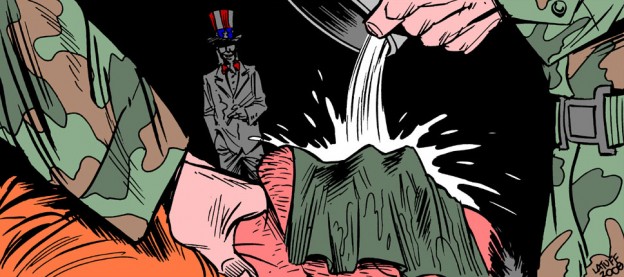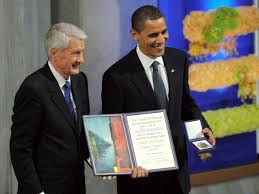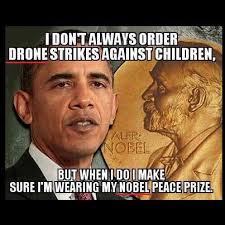Finanzmarkt- und Konzernmacht-Zeitalter der Plutokratie unterstützt von der Mediakratie in den Lobbykraturen der Geld-regiert-Regierungen in Europa, Innsbruck 2014-10-31
Liebe® Blogleser_in,
Bewusstheit, Liebe und Friede sei mit uns allen und ein gesundes sinnerfülltes Leben wünsch ich ebenfalls.
Aus dieser Quelle zur weiteren Verbreitung entnommen: http://www.heise.de/newsticker/meldung/Friedensnobelpreistraeger-fordern-von-Obama-Freigabe-des-CIA-Folterreports-2437397.html
Friedensnobelpreisträger fordern von Obama Freigabe des CIA-Folterreports
In einem offenen Brief appellieren zwölf Friedensnobelpreisträger an US-Präsident Obama, die Bericht über die Folterpraktiken der CIA öffentlich zu machen.
Zwölf Friedensnobelpreisträger verlangen in einem offenen Brief an US-Präsident Obama – ebenfalls Träger der Auszeichnung –, den angekündigten Bericht über die Folterpraktiken der CIA zu veröffentlichen. Nur wenn die „dunkle Zeit der US-Geschichte“ ans Licht gebracht würde, könnten die Vereinigten Staaten diese hinter sich lassen. Die Unterzeichner, zu denen Folteropfer wie der Argentinier Adolfo María Pérez Esquivel gehören, erinnern daran, dass Folter in den Opfern, aber auch den Tätern lange nachwirkt. Im Fall der USA hätten diese Praktiken besonders schwere Folgen, weil das Land mit seiner aufklärerischen Vergangenheit seit Jahrhundert Vorbild für die Welt sei.
Veröffentlichung wird unwahrscheinlicher
Eine der angewandten Folterpraktiken war das berüchtigte Waterboarding.
Bild: Carlos Latuff Der offene Brief kommt zu einem Zeitpunkt, an dem nicht wenige Beobachter befürchten, dass der Bericht gar nicht an die Öffentlichkeit kommen könne. Wenige Wochen vor den Halbzeitwahlen in den USA, scheint das für die CIA zuständige Weiße Haus die Veröffentlichung herauszuzögern. Nachdem die CIA in die Schwärzungen des Berichts einbezogen wurde, können sich Regierung und Parlamentarier nicht darauf einigen, wie viele Einzelheiten öffentlich gemacht werden sollen.
Wie The Intercept vergangene Woche berichtet hatte, schieben sich das zuständige Geheimdienstkomitee im Senat und das Weiße Haus seit Monaten ihre Schwärzungsvorschäge hin und her. Sollte das die Veröffentlichung vor den Wahlen verhindern, könnte der erwartete Mehrheitswechsel im US-Senat das endgültige Aus bedeuten. Die Republikaner, die bislang weniger Interesse an einer Aufarbeitung der Amtszeit von US-Präsident George W. Bush gezeigt haben, könnten die Veröffentlichung dann endgültig verhindern.
Die mehr als 6000 Seiten lange Untersuchung der Folterpraktiken der CIA im „Krieg gegen den Terrorismus“ war im Frühjahr in den Blickpunkt der Öffentlichkeit gerückt. Da war bekannt geworden, dass die CIA, die für den Bericht zuständigen Parlamentarier ausgespäht hatte. Dianne Feinstein (Demokraten), die vorher nicht als geheimdienstkritisch aufgefallene Vorsitzende des zuständigen Ausschusses im US-Senat, hatte daraufhin schwere Vorwürfe gegen den US-Geheimdienst erhoben.
Die CIA habe mit ihrem Vorgehen gegen die Gewaltenteilung verstoßen, erklärte sie. Trotzdem durfte der Dienst, beziehungsweise das Weiße Haus, die nur ein paar Hundert Seiten lange Zusammenfassung des fertigen Berichts vor deren Veröffentlichung prüfen. Die wurde deswegen immer weiter hinausgezögert und könnte nun ganz ausfallen.
Ein Ende von Guantanamo
Das wollen nun unter anderem Desmond Tutu aus Südafrika (Friedensnobelpreis 1984), sein Landsmann Frederik Willem de Klerk (Auszeichnung 1993) und der Ägypter Mohammed el-Baradei (2005) verhindern. Gemeinsam fordern sie nicht nur die vollständige Offenlegung der Untersuchungsergebnisse, sondern auch eine Bestätigung, dass die Geheimgefängnisse geschlossen wurden.
Ein Punkt, um den es in der CIA-Untersuchung gar nicht geht, sprechen sie ebenfalls an: Sie fordern eine klare Regelung für die Schließung des Gefangenenlagers in Guantanamo, das von der US-Marine geführt wird. Schlussendlich plädieren sie für die Einhaltung internationaler Verträge, wie der Genfer Konvention und der UN-Konvention gegen Folter. (mho)
Quelle: http://thecommunity.com/no-to-torture/
The Letter
President Barack Obama
The White House
1600 Pennsylvania Avenue NW
Washington, DC 20500
Dear Mr. President,
The open admission by the President of the United States that the country engaged in torture is a first step in the US coming to terms with a grim chapter in its history. The subsequent release of the Senate Select Committee on Intelligence summary report will be an opportunity for the country and the world to see, in at least some detail, the extent to which their government and its representatives authorized, ordered and inflicted torture on their fellow human beings.
We are encouraged by Senator Dianne Feinstein’s recognition that “the creation of long-term, clandestine ‘black sites’ and the use of so-called ‘enhanced-interrogation techniques’ were terrible mistakes,” as well as the Senate Committee’s insistence that the report be truthful and not unnecessarily obscure the facts. They are important reminders that the justification of the torture of another human being is not a unanimous opinion in Washington, or among Americans as a whole.
We have reason to feel strongly about torture. Many of us among the Nobel Peace Prize laureates have seen firsthand the effects of the use of torture in our own countries. Some are torture survivors ourselves. Many have also been involved in the process of recovery, of helping to walk our countries and our regions out of the shadows of their own periods of conflict and abuse.
It is with this experience that we stand firmly with those Americans who are asking the US to bring its use of torture into the light of day, and for the United States to take the necessary steps to emerge from this dark period of its history, never to return.
The questions surrounding the use of torture are not as simple as how one should treat a suspected terrorist, or whether the highly dubious claim that torture produces “better” information than standard interrogation can justify its practice. Torture is, and always has been, justified in the minds of those who order it.
But the damage done by inflicting torture on a fellow human being cannot be so simplified. Nor is the harm done one-sided. Yes, the victims experience extreme physical and mental trauma, in some cases even losing their lives. But those inflicting the torture, as well as those ordering it, are nearly irreparably degraded by the practice.
As torture continues to haunt the waking hours of its victims long after the conflict has passed, so it will continue to haunt its perpetrators.
When a nation’s leaders condone and even order torture, that nation has lost its way. One need only look to the regimes where torture became a systematic practice – from Imperial Japan and Nazi Germany to the French in Algeria, South Vietnam, the Khmer Rouge and others – to see the ultimate fate of a regime so divorced from their own humanity.
The practices of torture, rendition and imprisonment without due process by the United States have even greater ramifications. The United States, born of the concept of the inherent equality of all before the law, has been since its inception a hallmark that would be emulated by countries and entire regions of the world. For more than two centuries, it has been the enlightened ideals of America’s founders that changed civilization on Earth for the better, and made the US a giant among nations.
The conduct of the United States in the treatment of prisoners through two World Wars, upholding the tenets of the Geneva Convention while its own soldiers suffered greatly from violations at the hands of its enemies, again set a standard of treatment of prisoners that was emulated by other countries and regions.
These are the Americans we know. And believing that most Americans still share these ideals, these are the Americans we speak to.
In recent decades, by accepting the flagrant use of torture and other violations of international law in the name of combating terrorism, American leaders have eroded the very freedoms and rights that generations of their young gave their lives to defend. They have again set an example that will be followed by others; only now, it is one that will be used to justify the use of torture by regimes around the world, including against American soldiers in foreign lands. In losing their way, they have made us all vulnerable.
From around the world, we will watch in the coming weeks as the release of the Senate findings on the United States torture program brings the country to a crossroads. It remains to be seen whether the United States will turn a blind eye to the effects of its actions on its own people and on the rest of the world, or if it will take the necessary steps to recover the standards on which the country was founded, and to once again adhere to the international conventions it helped to bring into being.
It is our hope that the United States will take the latter path, and we jointly suggest that the steps include:
- Full disclosure to the American people of the extent and use of torture and rendition by American soldiers, operatives, and contractors, as well as the authorization of torture and rendition by American officials.
- Full verification of the closure and dismantling of ‘black sites” abroad for the use of torture and interrogation.
- Clear planning and implementation for the closure of Guantanamo prison, putting an end to indefinite detention without due process.
- Adoption of firm policy and oversight restating and upholding international law relating to conflict, including the Geneva Convention and the UN Convention against Torture, realigning the nation to the ideals and beliefs of their founders – the ideals that made the United States a standard to be emulated.
Respectfully,
President José Ramos-Horta, Timor-Leste,
Nobel Peace Prize laureate, 1996
Leymah Gbowee, Liberia,
Nobel Peace Prize laureate, 2011
John Hume, Northern Ireland,
Nobel Peace Prize laureate, 1998
Bishop Carlos X. Belo, Timor-Leste,
Nobel Peace Prize laureate, 1996
Archbishop Desmond Tutu, South Africa,
Nobel Peace Prize laureate, 1984
Muhammad Yunus, Bangladesh,
Nobel Peace Prize laureate, 2006
F.W. De Klerk, South Africa,
Nobel Peace Prize laureate, 1993
Betty Williams, Northern Ireland,
Nobel Peace Prize laureate, 1976
Mohammad ElBaradei, Egypt,
Nobel Peace Prize laureate, 2005
Oscar Arias Sanchez, Costa Rica,
Nobel Peace Prize laureate, 1987
Jody Williams, USA,
Nobel Peace Prize laureate, 1997
Adolfo Perez Esquivel, Argentina,
Nobel Peace Prize laureate, 1980
————————————————————————————————
Aus dem per ÖVP-Amtsmissbräuche offenkundig verfassungswidrig agrar-ausgeraubten Tirol, vom friedlichen Widerstand, Klaus Schreiner
Don´t be part of the problem! Be part of the solution. Sei dabei! Gemeinsam sind wir stark und verändern unsere Welt! Wir sind die 99 %! Wir sind die Veränderung, die wir uns wünschen.
PS.: Übrigens die 25. Innsbrucker Friedensmahnwache findet am Montag den 03.11.14 um 18:00 Uhr bei der Annasäule statt. Sei dabei! Unterstütze mit Deiner Anwesenheit die friedliche Bewegung FÜR Frieden in Europa und auf der ganzen Welt!





Und – bis zum 9.10.2014 – immer wenn ich mich bei Podiumsdiskussionen als Folteropfer der STASI outete wurde ich angeschaut wie ein Aussenirdischer, weil die Ewiggestrigen aus den Sicherheitsorganen und aus der Justiz tönten immer: Das ist Lüge, Verleumdung, Dr. Knabes Gruselkabinett, in DDR Zuchthäusern wurde niemand gefoltert oder mißhandelt…
Der am lautesten tönte und am meisten von sich schriftlich gab war der Vizeminister des Ministerium des Inneren der DDR Generalmajor Dieter Winderlich, der nach dem ich im Offenen Brief aufgerufen hatte , verstummt iast !?? Und der Chefideologe und Hausanwalt der ISOR e.V. RA Dr Friedrich Wolff dazu.
Da sieht man wieder dass : Die schrecklichste Waffe gegen Verleumdung und Lügen ist die WAHRHEIT… eine Feststellungsklage ist diesbezüglich am Verwaltungsgericht Berlin eingereicht…wir harren der Dinge, die uns die Berliner Justiz präsentieren wird: http://adamlauks.com/2014/10/12/ich-entlarve-hiermit-die-ddr-exekutive-und-bezichtige-den-inspekteur-des-mdi-generalmajor-dieter-winderlich-der-verleumdung-der-folter-im-strafvollzug-der-ddr-und-klitterung-der-geschichte-der-ddr/